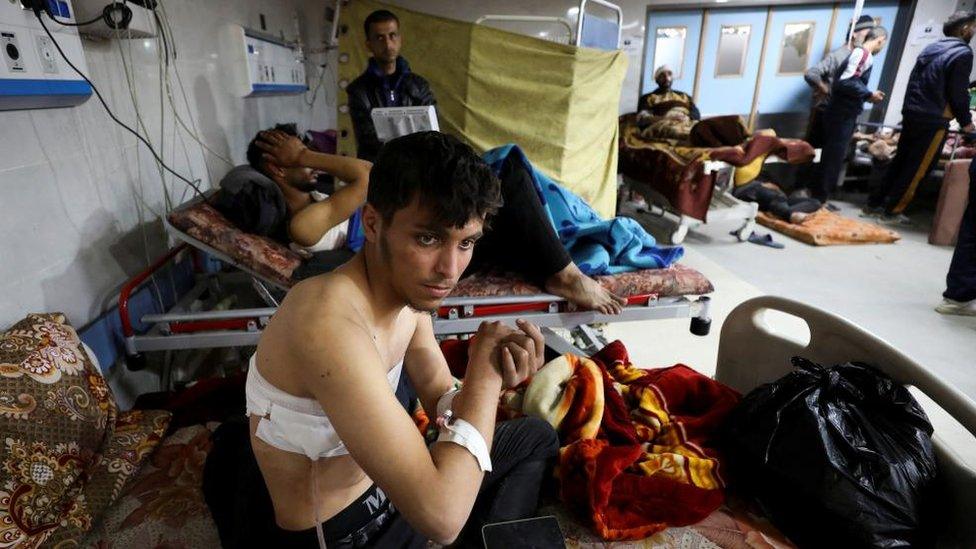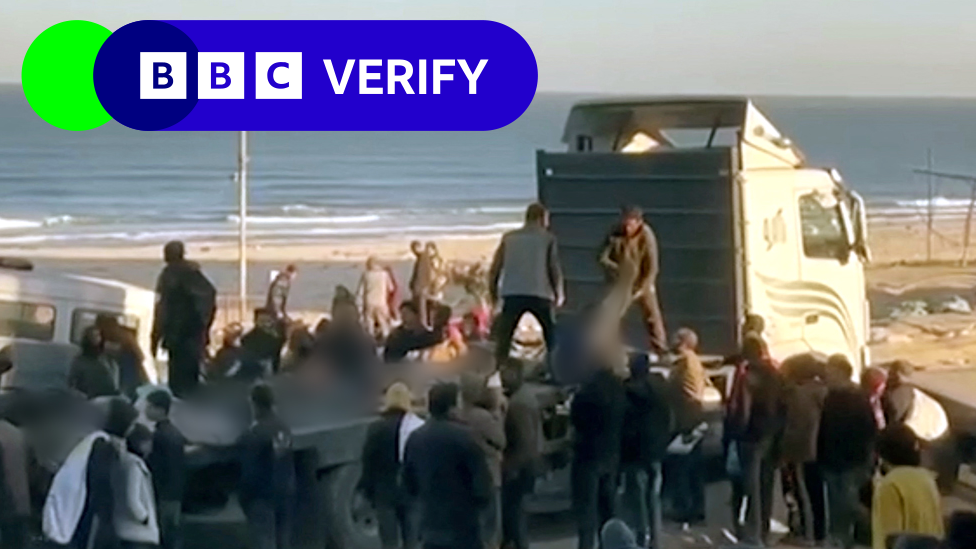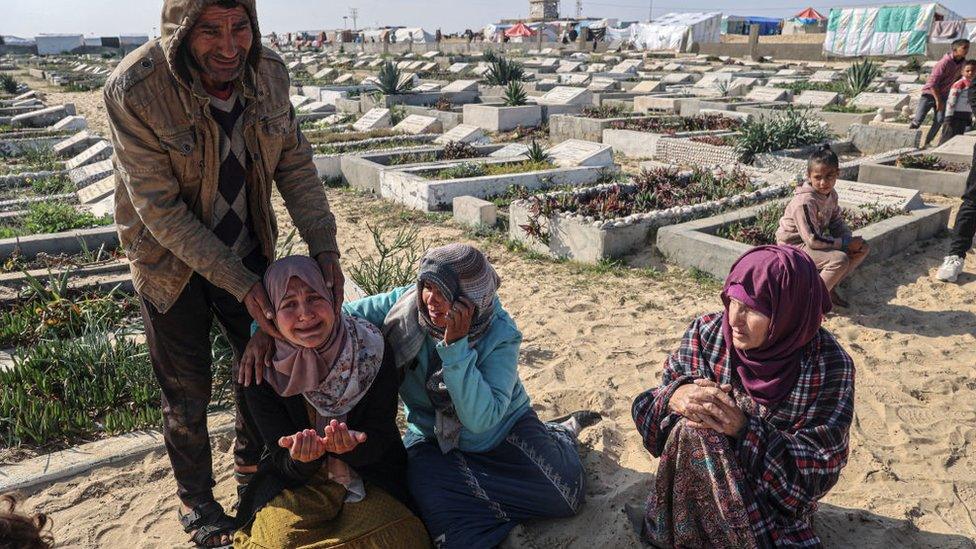Israel-Gaza war: US carries out its first aid airdrop in strip
- Published
Watch: US parachutes humanitarian aid into Gaza
The US has carried out its first airdrop of humanitarian aid for Gaza, with more than 30,000 meals parachuted in by three military planes.
The operation, carried out jointly with Jordan's Air Force, was the first of many announced by President Joe Biden.
The head of a well-known aid organisation told the BBC he thought there was a famine in northern Gaza.
At least 112 people were killed as crowds rushed to an aid convoy outside Gaza city on Thursday.
Hamas has accused them for the killing. Israel denies this and says it is investigating.
The first US airdrop comes as a top US official said the framework of a deal for a six-week ceasefire in Gaza was in place.
The Biden administration official said on Saturday that Israel had "more or less accepted" the deal.
"It will be a six-week ceasefire in Gaza starting today if Hamas agrees to release the defined category of vulnerable hostages (...) the sick, the wounded, elderly and women," the unnamed official said.
Mediators are due to reconvene in Cairo on Sunday, and Egyptian officials said delegations from both Hamas and Israel were expected to arrive for the negotiations.
One official said certain technical issues around a possible deal still needed to be resolved, such as how many Palestinian prisoners would be released by Israel in exchange for hostages held by Hamas.
On Saturday C-130 transport planes dropped more than 38,000 meals along the Gaza coastline, US Central Command said in a statement.
"These airdrops are part of a sustained effort to get more aid into Gaza, including by expanding the flow of aid through land corridors and routes," it added.
Other countries including the UK, France, Egypt and Jordan have previously airdropped aid into Gaza, but this is the first by the US.
Jan Egeland, head of aid organisation the Norwegian Refugee Council, has just returned from a three-day visit to Gaza.
"I was prepared for nightmare, but it is worse, much worse," Mr Egeland told the BBC on Sunday.
"People want to take your hand... saying 'we are starving, we are dying here'.
"I think there is famine in the north," he said, adding that there had been no aid for 300,000 people living in ruins, with Israel not allowing any through.
US administration officials said that Thursday's "tragic incident" had highlighted "the importance of expanding and sustaining the flow of humanitarian assistance into Gaza in response to the dire humanitarian situation".

Dozens of people are being treated at al-Shifa Hospital following Thursday's tragedy
Aid agencies have said that airdrops are an inefficient way of delivering aid.
"Airdrops are expensive, haphazard and usually lead to the wrong people getting the aid," Mr Egeland said.
Displaced Gaza resident Medhat Taher told Reuters news agency that such a method was woefully inadequate.
"Will this be enough for a school? Is this enough for 10,000 people?" he said. "It's better to send aid via crossings and better than airdropping via parachutes."
In his statement on Friday, President Biden said the US would "insist that Israel facilitate more trucks and more routes to get more and more people the help they need".
US Vice-President Kamala Harris will meet Israeli war cabinet member Benny Gantz in Washington on Monday to discuss a truce and other issues, Reuters quotes a White House official as saying.
In Thursday's incident, 112 people were killed and more than 760 injured as they crowded around aid lorries on the south-western edge of Gaza City.
Israel said most died in a crush after it fired warning shots.
Giorgios Petropoulos, head of the Gaza sub-office of the UN Co-ordinator for Humanitarian Affairs (OCHA) told the BBC that he and a team sent to al-Shifa hospital had found a large number of people with bullet wounds.
Watch: Devastation after dozens killed in Gaza aid operation
Hamas meanwhile said an Israeli bombardment had killed at least 11 people at a camp in Rafah in southern Gaza on Saturday. World Health Organization chief Tedros Adhanom Ghebreyesus called the attack "outrageous". The Israeli army said it had carried out a "precision strike" against Islamic Jihad militants in the area.
The UN's World Food Programme has warned that a famine is imminent in northern Gaza, which has received very little aid in recent weeks, and where an estimated 300,000 people are living with little food or clean water.
The Israel military launched a large-scale air and ground campaign to destroy Hamas after its gunmen killed about 1,200 people in southern Israel on 7 October and took 253 back to Gaza as hostages.
Gaza's Hamas-run health ministry says more than 30,000 people, including 21,000 children and women, have been killed in Gaza since then with some 7,000 missing and at least 70,450 injured.
Related topics
- Published1 March 2024

- Published2 March 2024

- Published29 February 2024
